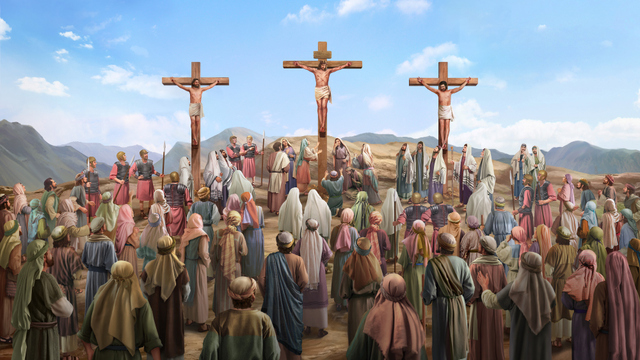1. “The work Jesus did at that time was to redeem the whole mankind. Whoever believed in him would be forgiven of his sins. As long as you believed in him, he would redeem you; as long as you believed in him, you were no longer of sin and came out of sin. This means that you were saved and were justified by faith. But in the believers there were still disobedience and resistance, which had to be cast off gradually. Being saved does not mean that one was completely gained by Jesus, but means that he was no longer of sin and was forgiven of his sins; it means that as long as you believed in him, you would never be of sin.At that time Jesus did not come to perfect people or gain people but to do a stage of work, to bring the gospel of the kingdom of heaven and accomplish the work of crucifixion, so after the crucifixion his work completely ended. But in the conquering work in this stage, God has to speak more words, do more works, and take many processes, and he has to unlock the mysteries of the work Jesus did and of the work Jehovah did so that all people can believe in a clear and crystal way, because this is the work in the end time and the end time is for the concluding work and is the time to end the work.”
from “The Vision of the Work (2)” in The Word Appears in the Flesh
the-crucifixion-of-the-lord-jesus_2. “He suffered on earth for thirty-three and a half years, being ridiculed, slandered, and rejected, and even having no place to lay his head and no place to rest. And then he was crucified, having his whole being, a holy and innocent flesh, nailed onto the cross, and suffered all kinds of pain. Those in power mocked him and flogged him, and the soldiers even spat in his face, yet he still remained silent, endured to the end, obeyed unto death unconditionally, and redeemed all mankind. Only after that did he have rest. The work he did only represents the Age of the Grace and it does not represent the Age of the Law and cannot replace the work of the end time. This is the substance of the work Jesus did in the Age of the Grace, which is the second age mankind has gone through—the Age of the Redemption.”
from “The Inside Truth of the Work in the Age of the Redemption” in The Word Appears in the Flesh
3. “In man’s eyes, when God was crucified, he had ended the work of his incarnation, having redeemed all mankind and held the keys of Hades. Men all thought that God’s work had been completely accomplished. Actually, in God’s eyes, only a small part of his work had been accomplished, and he had only redeemed mankind but had not conquered mankind, much less changed man’s ugly satanic image. So God said, ‘Although my incarnated flesh has passed through the suffering of death, it is not the whole purpose of my incarnation. Jesus is my beloved Son and was crucified for me, yet he had not completely ended my work but had only done part of it.’ Thus, God started his second plan to continue the work of his incarnation. God’s ultimate intention was to perfect and gain all those who had been saved from Satan’s hand.”
from “Work and Entering In (6)” in The Word Appears in the Flesh
4. “Although people have been redeemed and forgiven of their sins, this only means that God does not remember their transgressions and does not treat them according to their transgressions. But as they live in the flesh and have not broken away from sins, they cannot but continue to commit sins and continually manifest their corrupt satanic disposition. This is their life of committing sins continually and being forgiven continually. Most people commit sins in the day and confess them at night. Thus, even if the sin offering is forever effective to them, it cannot save them from sins. This means that the work of salvation has only been half completed, because people still have corrupt disposition. … This is man’s corruption, the deep-rooted thing planted in man by satan, which is deeper than sin. People cannot easily discover their sins, and they have no way to discover their deep-rooted nature. The result has to be achieved through the judgment of the word. Only thus can people start to be transformed gradually.”
from “The Mystery of Incarnation (4)” in The Word Appears in the Flesh




